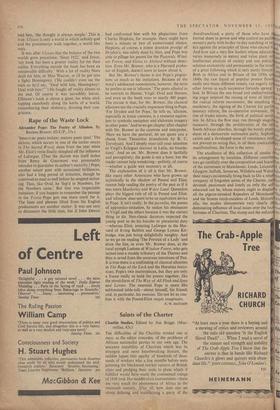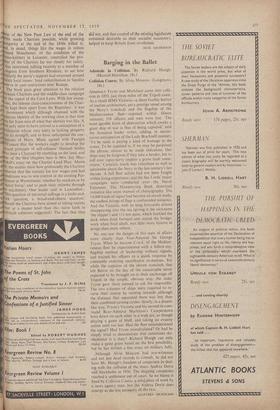Saints of the Charter •
THE difficulties of the Chartists remind one at once, as the editor concedes, of the problems of African nationalist parties in our own age. The uncanny instability of Chartism which was its strangest and most heartbreaking feature, the sudden lapses into apathy of hundreds of thou- sands of workers who a few months before were jamming the blackened market squares of British cities and pledging their souls to plans which if fulfilled would have made the continental risings 'of 1848 look like middle-class tournaments—these are very much the phenomena of Africa in the twentieth century. After all, how does one set about defining and maintaining a party of the disenfranchised, a party of those who have a formal share in power and who control no parlia mentary party with its day-to-day matching of tat: tics against the principles of those who elected it And how can a very few leaders whose educatio varies immensely in nature and value plant on intellectual analysis of society and one politic solution exclusively and permanently in the mind of a great following which is only partly literate." Both in Africa and in Britain of the 1830s an 1840s the raw liquid of popular protest flowe easily into many different vessels, ran eagerly int other forms as each successive formula sprang leak. In Britain the one broad and undiscriminat ing anger inspired the raising of trees of liberty the radical reform movements, the smashing 0 machinery, the signing of the Charter for parlia mentary reform, the co-operative movement, th rise of trades unions, the birth of political social ism. In Africa the flow may run through magic massacre, through the proliferation of the tin South African churches, through the wordy proce dures of a democratic nationalist party. Sophisti cation and a developed sense of consistency must 'um not prevent us seeing that, in all these contrastin manifestations, the force is the same.
The excellence of this collection of studies i its arrangement by localities. Different contribtt tors go carefully over the composition and histo of the movement in Manchester, Leeds, Leicester Glasgow, Suffolk, Somerset, Wiltshire and Wales their essays incidentally bring back to life a wh company of forgotten saints of the Charter, me devoted, passionate and lonely as only the self educated can be, whose statues ought to displa all the pigeon-streaked Repealers of Manchest and the bronze torch-maidens of Leeds. Histori ally, the studies demonstrate very clearly t dominating influence of local issues over the loc fortunes of Chartism. The slump and the enforc
ac it
Ill
i0
at .ty ia th :al es
HE SPECTATOR, NOVEMBER 13 ent of the New Poor Law at the end of the 830s made Chartism possible, while growing rosperity at the end of the 1840s killed it; nd, in detail, things like the wages in cotton round Manchester, or the condition of the ame-knitters in Leicester, controlled the pro- ress of the Chartists far too closely for safety. Was interested, talking recently to a member of ngress from Southern Rhodesia, to see how 'Milady the party's support had swarmed around urely local issues: land redistribution in Sipolilo eserve or yam restrictions near Rusape.
The book pays great attention to the relation etween Chartism and the middle-class campaign or the repeal of the Corn Laws. With few excep- ions, the intense class-conseiousness of the Char- ists kept them apart from the Repealers: it was movement which although obsessed with the eparate identity of the working class at that time as far from sure of what that identity was like. A ew ce only seem to have arrived at a conception of a ,
oluariat whose very unity in lacking property 3,:sit as its strength, and to have anticipated the con- Iusions of Marx. Many agreed with Feargus I 'Connor that the workers ought to develop the grand principle of self-reliance (Samuel Smiles as once a Chartist) by resettling on the land, and ne of the best chapters here is Mrs. 'Joy Mac- sk ill's essay on the Chartist Land Plan. Above II, the studies show how profoundly the Chartists elieved that the remedy for low wages and bad conditions was to win control of the existing Par- liament at Westminster, whether by muskets or by 'tnoral force,' and to push their reforms through its machinery. One leader said in Lancashire : 'This question of universal suffrage is a knife-and- lork question, a bread-and-cheese question.' Should the Chartists have aimed at taking society )ver at a deeper level than this naive faith in
olitieal solutions suggested'? The fact that they
did not, and that control of the existing legislature remained desirable to their socialist successors, helped to keep Britain from revolution.
NEAL ASCHERSON











































 Previous page
Previous page